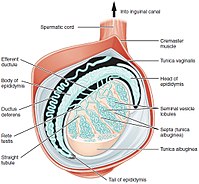
Photo from wikipedia
The heat-inducible expression system has been widely used to produce recombinant proteins in Escherichia coli. However, the rise in temperature affects cell growth, activates the bacterial Heat-Shock Response (HSR), and… Click to show full abstract
The heat-inducible expression system has been widely used to produce recombinant proteins in Escherichia coli. However, the rise in temperature affects cell growth, activates the bacterial Heat-Shock Response (HSR), and promotes the formation of insoluble protein aggregates known as inclusion bodies (IBs). In this work, we evaluate the effect of the culture scale (shake flasks and bioreactors) and induction temperature (39 and 42 °C) on the kinetic behavior of thermoinducible recombinant E. coli ATCC 53606 producing rESAT-6 (6-kDa early-secretory antigenic target from Mycobacterium tuberculosis), compared with cultures grown at 30 °C (without induction). Also, the expression of the major E. coli chaperones (DnaK and GroEL) was analyzed. We found that almost twice maximum biomass and rESAT-6 production were obtained in bioreactors (~ 3.29 g/L of biomass and ~ 0.27 g/L of rESAT-6) than in shake flasks (~ 1.41 g/L of biomass and ~ 0.14 g/L of rESAT-6) when induction was carried out at 42 °C, but similar amounts of rESAT-6 were obtained from cultures induced at 39 °C (~ 0.14 g/L). In all thermo-induced conditions, rESAT-6 was trapped in IBs. Furthermore, DnaK was preferably expressed in the soluble fraction, while GroEL was present in IBs. Importantly, IBs formed at 39 °C, in both shake flasks and bioreactors, were more susceptible to degradation by proteinase-K, indicating a lower amyloid content compared to IBs formed at 42 °C. Our work presents evidence that the culture scale and the induction temperature modify the E. coli metabolic response, expression of chaperones, and structure of the IBs during rESAT-6 protein production in a thermoinducible system.
Journal Title: Cell Stress and Chaperones
Year Published: 2019
Link to full text (if available)
Share on Social Media: Sign Up to like & get
recommendations!